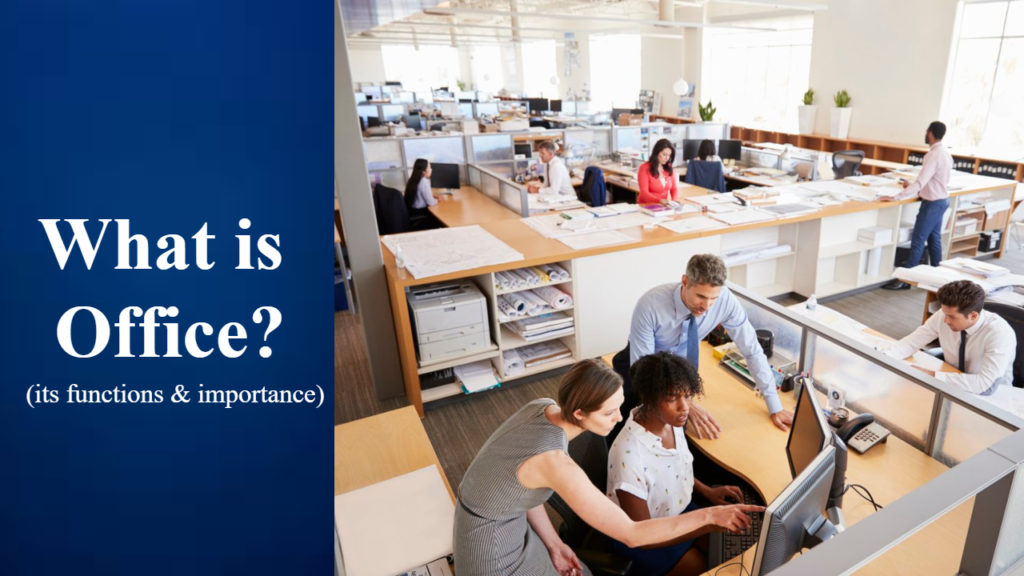
What is Office
The term office is commonly used to mean a place where all paperwork is undertaken.
Common man’s view of an office is a place where some clerks and a few officers sit on chairs with a few files on their table doing some writing
Office work is not confined to paperwork only, and it may not be confined to a particular place
The modern view is that office is the administrative centre of business where relevant records are prepared, preserved, and made available for the purpose of efficient management of the organisation.
The term ‘office’ can be’ defined as any place where records are prepared, handled and preserved for future reference, and making them available as and when required
Functions of Modern Office.
- Primary Functions or Basic functions
- Administrative/management functions
Primary Functions.
The basic functions of the office include
- Receiving or Collecting Information
- Orgainising,
- Storing
- Supplying Information.
Receiving or Collecting Information: In every organisation, be it a government or private one, information comes through letters, circulars, memos, orders, reports, etc., from within and outside the organisation.
- Internal sources(Within the organisation in the form of letter, notes, memos, circulars, etc.)
- External sources(from outside the organisation through letters, inquiries, order invoices circulars, notices, etc.)
Organising Information: The office mostly receives information in raw or crude form. The information so received cannot be of any use to the management unless it is processed and presented in a suitable form. While organising information, the task of the office comprises arrangement, summarising tabulation, and graphic presentation of data
Storing Information: The recorded information accumulated in the office needs to be preserved and maintained for future reference. The basic objective of preserving information is to make these available as and when required by management without delay.
Supplying Information: Management decision making depends a great deal on the supply of accurate and timely information. Management may need the information of a routine nature to be supplied by the office periodically, like statements of attendance, stock position, cash, and bank balances, etc.
Administrative Management Functions
- Planning
- Coordination
- Communication
- Safety & Security
- Cost Reduction
- Public Relation
- Staffing
Planning: It has to be decided beforehand, what is to be done, who is to do, how it will be done, and when. Planning is necessary to avoid wastage and delay, and to reduce the cost of operations.
Coordination: Office has to synchronizes the efforts of individuals and departmental staff to ensure proper timing and sequence of activities so that the organisation objectives are fully realized.
Communication: Through communication, people are linked with the organisation to achieve a specific objective
Safety & Security: The office has to keep in safe custody the records of the organisation and also make arrangements for the security of properties and assets of the enterprise e.g. buildings, office machines, furniture, equipment, etc.
Cost Reduction: It is only through improvements, in systems, methods, and procedures that the costs of operation can be minimized With the adoption of the scientific methods in office administration, the office must lay down systems, procedures, and methods of performing various activities.
Public Relations: The public must also be kept informed about the policies, programmes of the organisation with respect to matters of public interest Steps are required to be taken to build a good image of the organisation in the minds of the general public.
Storing Information: The recorded information accumulated needs to be preserved and maintained for future reference. The basic objective of preserving information is to make these available as and when required by management without delay.
Supplying Information: Management decision making depends a great deal on the supply of accurate and timely information. Management may need the information of a routine nature to be supplied periodically, like statements of attendance, stock position, cash, and bank balances, etc.
Importance of Office
Some importance of an office are as follows:
- Information center
- Act as a communication Channel
- linkage between departments
- decision-making
- co-ordinating activities
- controls cost of operations